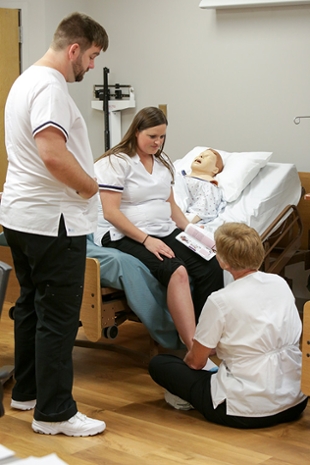About
MISSION
The mission of the MGA Nursing Programs is to provide quality evidence-based education which prepares students to become competent professional nurses and leaders. The purpose of the nursing programs is to prepare culturally sensitive graduates who are committed to provide safe and effective nursing care through health promotion and disease prevention, and are able to utilize clinical reasoning skills in the provision of care.
The mission of the Middle Georgia State University Master of Science in Nursing Program is to prepare advanced practice nurses to provide care to the entire adult to older adult age population and across the continuum of care, particularly those with acute care needs.
ACCREDITATION INFO
The Associate of Science in Nursing program at Middle Georgia State University is accredited by the: Accreditation Commission for Education in Nursing (ACEN)
3390 Peachtree Road NE, Suite 1400 Atlanta, GA 30326
(404) 975-5000
The most recent accreditation decision made by the ACEN Board of Commissioners for the Associate of Science in Nursing program is Continuing Accreditation.
View the public information disclosed by the ACEN regarding this program at http://www.acenursing.com/accreditedprograms/programsearch.htm
The Bachelor of Science in Nursing program at Middle Georgia State University is accredited by the: Accreditation Commission for Education in Nursing (ACEN)
3390 Peachtree Road NE, Suite 1400 Atlanta, GA 30326
(404) 975-5000
The most recent accreditation decision made by the ACEN Board of Commissioners for the Bachelor of Science in Nursing program is Continuing Accreditation.
View the public information disclosed by the ACEN regarding this program at http://www.acenursing.com/accreditedprograms/programsearch.htm
The Master of Science in Nursing program at Middle Georgia State University is accredited by the: Accreditation Commission for Education in Nursing (ACEN)
3390 Peachtree Road NE, Suite 1400 Atlanta, GA 30326
(404) 975-5000
The most recent accreditation decision made by the ACEN Board of Commissioners for the Master of Science in Nursing program is Continuing Accreditation.
View the public information disclosed by the ACEN regarding this program at http://www.acenursing.com/accreditedprograms/programsearch.htm
GREATNESS IS ...
OUR STUDENTS
- 2024 NCLEX pass rate for ASN graduates is 96%
- 2024 NCLEX pass rate for BSN graduates is 100%



OUR FACULTY and STAFF ARE
- Recognized state leaders in their profession and in nursing education
- Experts in practice sub-specialties and innovative teaching (online, flipped classroom and simulation)
- Recognized scholars who have been invited to speak/present at state, national, and international conferences

OUR PROGRAMS
- Offer face-to-face and on-line options
- Are available on our campuses in Dublin, Cochran, Macon and Warner Robins



End of Program Student Learning Outcomes
BSN EPSLOs
- Synthesizes nursing that is patient-centered, caring, culturally sensitive and based on the physiological, psychosocial and spiritual needs of patients.
- Collaborate with members of the inter-professional health care team to promote continuity of patient care and achievement of optimal outcomes.
- Interprets best current evidence, expert opinion, and clinical expertise as a basis for nursing practice and clinical judgment.
- Evaluates the development and implementation of quality improvement strategies to advance health care services.
- Provide a safe environment for patients, self, and others.
- Integrate information technology resources into the provision of patient care.
- Practice nursing in a professional, ethical, and legal manner.
- Use leadership skills in the delegation of safe, quality patient care.
ASN EPSLOs
- Evaluate nursing care to clients and families across the lifespan from diverse backgrounds in a variety of settings that is compassionate, age and culturally appropriate and based on client’s preferences, values and needs.
- Collaborate with members of the inter-professional healthcare team in the coordination of safe, quality care for clients and families so that optimal client outcomes are achieved and continuity of care is maintained.
- Demonstrate use of best current evidence and clinical expertise when making clinical decisions in the provision of patient-centered care.
- Provide a safe environment for client, self and others.
- Promote the development and implementation of quality improvement strategies to advance health care services.
- Integrate information technology into the provision of client care.
- Practice nursing in a professional, ethical and legal manner.
- Use leadership, management and priority setting skills in the provision and management of safe, quality patient-centered care.
MSN EPSLOs
- Synthesize nursing and related sciences to continually improve healthcare outcomes for individuals, families, communities, populations, or systems in a multicultural society.
- Lead multidisciplinary team collaboration, communication, and coordination to achieve health promotion and disease prevention, with the goal of improving patient and population health outcomes.
- Integrate current evidence, expert opinion, and clinical expertise as a basis for professional nursing practice and clinical judgment.
- Incorporate quality improvement principles in the monitoring, analyzing, and prioritizing of healthcare outcomes.
- Formulate advanced nursing measures to reduce risks and support safe, cost effective practices within a legal and ethical framework to improve health outcomes.
- Integrate the use of appropriate information technology resources into the provision of patient care to enhance care outcomes.
- Develop a leadership role in promoting health, shaping healthcare delivery systems and advancing values through policy development and advocacy at the local, state, national and global levels.
CONTACT
- Nursing Department Contact -
- Application Questions -
Admissions can help you with the application process.
Learn More